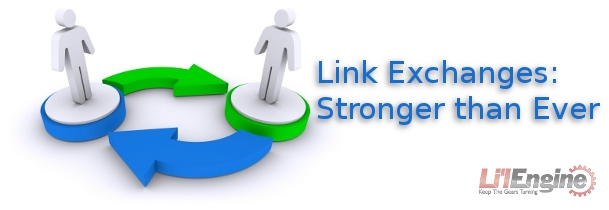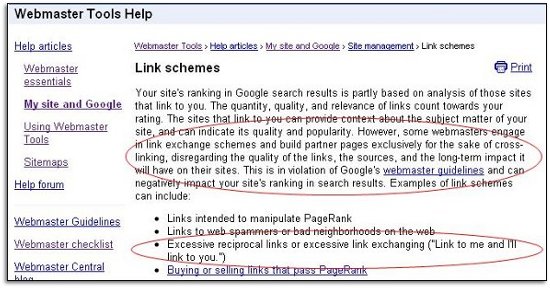Link Exchanges Stronger than Ever

If you’ve read this blog for any length of time, you might be scratching your head and saying, “What?”
We’ve come down hard on link exchanges for the purpose of building your Google PageRank or search engine standing, and there’s good reason for it. It started out as a way to cheat to get to the top. You give some links, and you get some back. It sounds harmless, and when done “organically” it’s not just harmless, it’s a great way to boost your position in the search engine rank pages (SERPs). Say you run a blog about motorcycle gear and you’ve been at it for awhile, so you’ve built up some history. You might find some of the site you wish would link to you (but that may never know you exist) and simply ask if they would link to your site. Quite often the answer is “yes.” Most legitimate websites have enough good will that they’ll give a promising newcomer a little help.
However, in between the link farms, which are created solely to increase back links regardless of relevancy or reputation, and doing it the old fashioned way by asking sites to link to you, there are some programs that walk a middle path. They may have a legitimate website where site owners can categorize their site and find other sites that are about the same (or nearly the same) topic. For example, such a site might have a category for cooking blogs and another category for political blogs, another for sites on antique book appraising, and a bunch more categories.
The idea is that each day you’ll go to your category or one that’s closely related, look at several sites, and click a button that gives that site some link love by placing a link to it. And every day a bunch of other sites in your niche will do the same thing and hopefully leave you some back links in exchange.
Is this “cheating”? Will search engines penalize you for this?
It’s hard to say.
In the screen shot you can see part of Google’s Webmaster guidelines that kind of / sort of address this. Clearly, exchanging links for the sake of links regardless of relevancy or quality is not good. Google will penalize your site for this.

On the other hand, it says that “link schemes” can damage your standing and include among “link schemes”
Excessive reciprocal links or excessive link exchanging (“Link to me and I’ll link to you.”)
The important word in that statement is “excessive.” How do you define “excessive”?
One way that link exchanges may seem excessive has less to do with their sheer numbers and more to do with their relevancy. If you run a site about organic gardening and exchange links with a couple of, ahem, “adult entertainment” blogs, you’re doing much more harm than good.
If, however, you participate in a link exchange with a relevant category and you find a few sites that you wouldn’t have found otherwise, that are good fits for your site as far as relevancy and quality, then there’s no real problem. If you had found those sites organically, you probably would have asked for links from them anyway. You just had a little help finding them.
Look at it this way: If Google gave no influence to back links, either good or bad, or if Google didn’t exist, would you link to those sites and ask for links to yours? Or alternatively, would you link to those sites even if you had no idea if they would link to you? If the answer is yes, then you’re probably OK.
If you run a site and you have, say three hours a day you devote to research and / or link building (I wish!) then you probably shouldn’t devote more than one of those hours to participating in a targeted link exchange. Spend the other two working on other off-page optimization like searching out new sites to evaluate and possibly ask for back links. That way you won’t risk an explosion in link numbers that would tip off the search engine gods and make them think you’re up to some illegitimate link-swapping.
When you find a relevant site that you really like, and you read it and are convinced it would be a good back link to have, asking directly for that back link means a lot more than the three or four links you might get on an “I’ll link to you if you link to me” site. For one thing, it’s great to get that vote of confidence when someone likes your site enough to ask for a link. The first time some cool site contacts you to ask for a back link is a milestone of sorts.
And another thing to consider is this: how many high quality sites do you know of that have link exchange “badges” – particularly above the fold – that indicate their participation in link exchange sites? Not many, I’d bet. While they’re not exactly signs of desperation, they show exactly what you’re up to, and indicate that maybe you can’t get back links any other way. Fair? Of course not. But that’s the reality you have to deal with.
Link farms and paid link exchanges really will harm your site, no question. Targeted link exchange programs where you give and ask for links based on relevancy and perceived quality can be OK, as long as you don’t depend “excessively” on these sites for links.







